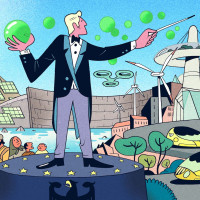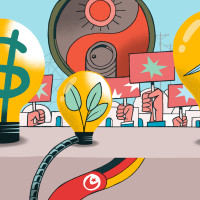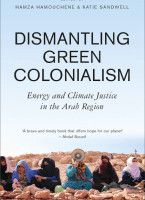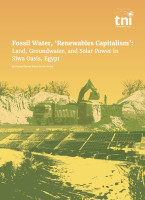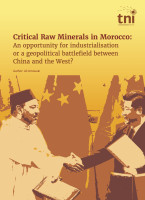Tunisia and the ELMED Project Electricity interconnection with Europe or subordination to the European energy agenda?
Regions
Tunisia faces a deepening energy crisis and rising dependence on external power. The ELMED project, linking Tunisia and Italy, is presented as a solution, but who truly benefits? This report critically examines the project’s impacts on sovereignty and justice, and proposes democratic, people-centered alternatives for a fair energy transition. Read to understand what’s at stake.
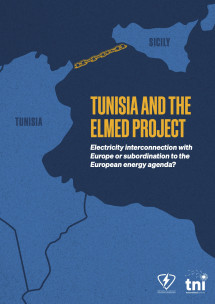
Downloads
Authors
Preface
Tunisia is in the midst of an energy crisis. Its energy independence rate is falling and it is increasingly reliant on imports of both natural gas and electricity from Algeria.
The government’s response has been to privatize the energy sector and submit to the recommendations of international financial institutions. The Working Group for Energy Democracy has criticized the government’s proposed solutions and put forward alternative proposals, notably in the 2022 report Towards a just energy transition in Tunisia: How to develop a democratic energy model that breaks with the current approach to renewable energy production.1
We now present a study of one energy project which the Tunisian government is pursuing with Northern partners: an electrical interconnection project between Tunisia and Italy known as ELMED. Consisting of a 200-kilometre submarine power line connecting the two countries, ELMED’s official aims are to ‘deliver a safer, more sustainable and more resilient supply of power while increasing the exchange of electricity generated from renewable sources which are driving the investment in clean generation systems’.2
This report compiles and critiques justifications put forward by official bodies and funding institutions. It sets evidence collected from the project’s proponents (official bodies and funding institutions) alongside objective data about the Tunisian context and the European electricity market. In addition, it reviews studies and articles by specialized institutions, and presents the Working Group’s own analyses and proposals.
The report has three parts. Part I sets out the context and introduces the ELMED project. Part II looks at the implications of the project for Tunisia. Part III outlines alternative proposals by the Working Group for Energy Democracy, rooted in justice and sovereignty, along with suggestions for partially reducing the implications of engaging in the ELMED project.
We hope that this report will help build an informed and critical understanding of how ELMED and other such energy initiatives reflect the demands of extractive capitalism, driven by Europe and the North, and support the struggle for a democratic energy model that breaks with the current approach to renewable energy production.
Executive Summary
Tunisia is facing an energy crisis. Its energy independence is declining: only around 48% of the primary energy in the country is produced domestically.
More than 95 per cent of the electricity used is produced from natural gas, of which about two-thirds is imported from Algeria. Tunisia also imports electricity from Algeria: imports accounted for 11% of electricity consumption in 2023.
This deficit is a burden on the state budget. According to the government, the deficit amounted to 8,983 million dinars (about €2,725 million) in 2023. In the same year, the cost of natural gas imports from Algeria reached approximately 3,517 million dinars (€1,065 million euros).
Enter ELMED
The ELMED project – involving a 200-km under-sea electrical cable linking Tunisia with Italy – is part of the Tunisian government’s proposed solutions to this crisis. Described as the ‘project of the century’3 by the Italian ambassador to Tunisia, Fabrizio Saggio, in 2023, the project will exchange electricity with a maximum capacity of 600 megawatts (MW), down from the 1,000 MW planned when the project was conceived in 2008.
The project has evolved since then, in response to the political changes following the Tunisian revolution of December 2010 – January 2011 and changes in the Italian electricity market, primarily due to the installation of new renewable energy power plants in southern Italy. It was originally based on plans to export electricity from Tunisia to Italy, but it is now envisaged that electricity will flow in both directions, at least in the short term. The focus on imports will help meet the official authorities’ aspiration, as recommended by its funders, to transform the publicly-owned Tunisian Electricity and Gas Company (Société Tunisienne de l’Electricité et du Gaz, or STEG) into a mere intermediary between producers and consumers.
The interconnection is scheduled to enter service by the end of 2028. The project is supported by international financial institutions. Tunisia’s share of the costs are being financed primarily through loans from international financial institutions, with the World Bank as the biggest lender, and a grant from the European Union. Italy also gets a grant from the EU, but is otherwise self-funding.
Claimed benefits for Tunisia
The project’s proponents argue that ELMED will have benefits for Tunisia, such as developing its renewable energy industry, reducing the cost of electricity for Tunisian households and companies, and improving energy security. The authorities justify the proposed import of electricity on the basis that it will reduce the need to import gas. However gas imports from Algeria will simply be replaced by electricity imports from Europe.
A hidden agenda to promote privatization and import dependency
Close examination of project documents, including the World Bank’s appraisal, reveals that far from serving Tunisia’s needs, the project was designed primarily to serve European, particularly Italian, energy demands.
It was also intended to promote privatization of the energy sector and draw Tunisia into dependence on imports. This export-oriented model relies heavily on foreign direct investment (FDI) and excludes Tunisia’s public utility (STEG) from meaningful participation.
Implications for Tunisia
Our research found that ELMED will have damaging effects on Tunisia’s economy, energy security, and carbon footprint.
Historical data shows that such FDI-driven projects are likely to drain hard currency, exacerbate Tunisia’s energy trade deficit, and consolidate corporate control over energy infrastructure. FDI often results in repatriation of profits to the investor country, rather than local reinvestment. Between 2000 and 2012, nearly $12 billion of FDI left Tunisia as dividends to foreign investors.
In particular, we found that:
- The project will increase STEG’s debt burden by at least 15%, from an estimated 7,850 million dinars (more than €2,300 million) in 2019.
- Tunisia is projected to lose around €220 million in hard currency during the first decade (2030–2040) of the project.
Failure to serve domestic needs
The supposed benefits to Tunisia are largely illusory.
ELMED may lead to exports being prioritised over domestic energy needs. STEG may be forced to cut electricity supply to local consumers to meet its export commitments. Proponents of the project say that only surplus electricity will be exported and that this will not affect national needs. However, the relevant law, the 2015 Law on the Production of Electricity from Renewable Energy Sources, allows for electricity export regardless of national needs. And the project could result in Tunisia paying for locally-produced electricity in hard currency, as if it were imported.
Official claims that renewable energy imports will reduce domestic electricity costs are based on flawed readings of European markets and disregard objective data from international institutions. The wholesale price of electricity – even when generated from renewable sources – is influenced by the most expensive production methods, typically gas. The market is also highly sensitive to developments in global energy markets, as well as unpredictable geopolitical factors such as the Russia–Ukraine crisis and the Zionist aggression in Gaza.
Requiring Tunisia to import electricity from Italy will make it vulnerable to fluctuations in the European market. In reality, electricity produced domestically by STEG is more cost-effective than imported alternatives, yet official narratives continue to justify imports in misleading terms.
Holding back renewable energy
Tunisia’s Energy Strategy set a goal of 4,850 MW renewable energy capacity by 2030. Yet as of 2024, no solar concession projects have been built.
Despite claims that it will create opportunities for local companies, ELMED is unlikely to help Tunisia’s domestic renewables energy industry to develop. It will primarily benefit foreign investors. To date, most concessions for renewable energy production in Tunisia have been awarded to European companies. No Tunisian companies have gained concessions as they are unable to invest in such large-scale projects or to access the European energy market and compete with major international companies.
Carbon emissions and climate justice
According to ELMED’s defenders, the project will reduce Tunisia’s carbon footprint. However the project may facilitate the import of electricity from non-renewable sources to Tunisia, giving the lie to its green objectives. In reality its primary role is to lower Europe’s carbon emissions – effectively externalizing decarbonization onto Tunisia.
The role of STEG
One of the unofficial aims of the project is to weaken and sideline Tunisia’s publicly-owned utility. STEG’s contribution to electricity production is expected to drop from 88% in 2023 to 36% by 2030. Its role will be reduced to a mere intermediary between producers and consumers.
Yet STEG is a huge asset to the country. It contributes to GDP growth and reduced dependence on foreign countries, despite its continued dependence on imported technology. It should be valued and supported.
Green colonialism
Rather than serving local needs, ELMED positions Tunisia as a conduit for Europe’s ‘green transition’, effectively exporting both energy and environmental responsibility. The Working Group for Energy Democracy argues that this represents a new form of green colonialism, in which Northern industrial powers offload their climate obligations onto Southern countries.
The commodification of electricity is at the heart of the energy agenda that Europe seeks to bring to North Africa. The ultimate outcome is to deprive the Tunisians of their right to control their natural resources, which will be monopolized by European capital to generate profit.
ELMED is a continuation of the neocolonial narrative aimed at providing the countries of the North with raw materials, including energy sources, from the global South. Despite the bright and seductive marketing, the content remains the same – consecrating dependency – while substituting traditional colonial tactics with new economic strategies.
Tunisia must reclaim control: renewable energy production should strengthen public ownership, prioritize national and community needs, and resist being subordinated to foreign markets and profit-driven FDI schemes. Energy sovereignty, not import/export dependency, must guide the country’s transition.
The report ends with recommendations to mitigate the impacts of ELMED and transform Tunisia’s energy sector based on the principles of justice, sovereignty, and environmental responsibility. These include
- development of a comprehensive national plan for electricity generation based on domestic energy needs, projected consumption patterns, and the renewable energy sources best suited to meet them
- amendment of the 2015 Law on the Production of Electricity from Renewable Energy Sources so that electricity exports are strictly limited to surplus production and carried out exclusively through STEG
- giving STEG the authority and resources to manage electricity production and distribution
- diversification of electricity production sources and in particular exploration of Tunisia’s potential 2,000 MW hydropower resources.
